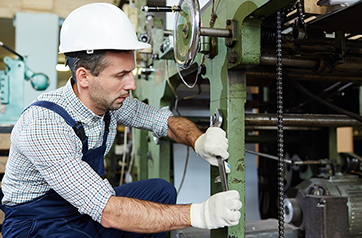Ensuring the seamless operation of machinery is vital in industries such as metal manufacturing and food processing, where continuous production and consistent product quality lie at the heart of business success. Thus, the regular maintenance of machinery and equipment becomes a top priority for business owners. By adopting a preventative maintenance strategy—focused on proactive measures rather than reactive repairs—companies can significantly enhance the efficiency and longevity of their machines. Moreover, preventative maintenance contributes to reduced downtime, lower repair costs, improved safety, and overall greater productivity.
A well-designed preventative maintenance strategy implies regularly monitoring, inspecting, and servicing equipment to identify and address potential issues before they escalate into downtime-causing problems. This approach can extend the lifespan of your machinery, prevent costly repairs, and maintain peak efficiency in production lines. In comparison, a reactive maintenance strategy, which focuses on addressing issues only after they emerge, can lead to higher repair costs, increased downtime, and decreased machine life—ultimately affecting the business’s bottom line.
In this blog post, we will delve into the key aspects of preventative maintenance for metal manufacturing machinery and food processing equipment, guiding you through the essential steps to develop and implement a robust strategy that keeps your operation running smoothly and efficiently.
Understanding Manufacturers' Maintenance Recommendations
Manufacturer recommendations serve as a valuable starting point when developing a preventative maintenance strategy for your machinery. Most equipment manufacturers provide guidelines for proper maintenance, including recommended schedules, procedures, and best practices. By adhering to these recommendations, businesses can ensure they address key maintenance tasks required to maintain their equipment in optimal condition. When implementing maintenance recommendations from manufacturers, consider the following:
- Obtain and review maintenance manuals provided by the manufacturer for each piece of machinery and equipment
- Consult with the manufacturer’s technical support team if clarification or additional information is required
- Adapt the recommendations to suit your specific operating conditions and production needs
Creating Customised Maintenance Schedules
A customised maintenance schedule is essential to effectively manage and organise your preventative maintenance activities. To develop a schedule tailored to your business, consider the following steps:
- Compile a list of all machinery and equipment requiring maintenance
- Identify the type and frequency of required maintenance tasks based on the manufacturer’s recommendations and your specific operating conditions
- Assign responsibilities for each maintenance task to a designated team member
- Establish milestones to measure progress, such as inspection intervals and completion deadlines
- Create a centralised tracking system (e.g., a maintenance management software) to manage, monitor, and update the maintenance schedule
Assigning Responsibilities and Building a Maintenance Team
Assigning responsibilities and building a dedicated maintenance team promotes accountability and ensures your preventative maintenance strategy is effectively executed. Key aspects to consider when building your maintenance team include:
- Assigning clear roles and responsibilities to each team member, ensuring an equal distribution of tasks
- Providing adequate training and development opportunities for your maintenance team members to enhance their skills and knowledge
- Regularly communicating with the team to discuss progress, challenges, and areas for improvement
- Encourage open feedback and foster a culture of continuous improvement within your maintenance team
Measuring the Effectiveness of Your Preventative Maintenance Program
It is crucial to regularly evaluate the effectiveness of your preventative maintenance program to ensure it is achieving the desired outcomes, such as reduced downtime, improved efficiency, and increased equipment lifespan. To measure the success of your preventative maintenance strategy, consider the following key performance indicators (KPIs):
- Equipment Downtime: Tracking the frequency and duration of downtime events can provide valuable insights into the effectiveness of your maintenance program in preventing unplanned stoppages.
- Repair Costs: A successful preventative maintenance strategy should lead to a reduction in reactive repair costs by identifying and addressing potential issues before they require extensive repairs.
- Overall Equipment Effectiveness (OEE): The OEE metric combines equipment availability, efficiency, and quality to provide a comprehensive measure of how well your machinery is performing relative to its potential capacity.
- Maintenance ROI: Assessing the return on investment (ROI) of your maintenance program can help you determine its cost-effectiveness and inform decisions on further maintenance optimisation efforts.
Commit to Proactive Maintenance for Long-Term Business Success
Implementing a comprehensive preventative maintenance strategy for your metal manufacturing machinery and food processing equipment is a crucial investment in your business’s long-term success. By understanding manufacturers’ recommendations, creating tailored maintenance schedules, assembling a dedicated maintenance team, and regularly evaluating the effectiveness of your maintenance program, you can proactively address potential issues and maintain your equipment in peak condition.
If you are ready to develop and implement a preventative maintenance strategy that supports the efficiency, reliability, and safety of your operation, look no further than Meng Solutions for a tailored consultation. As a trusted machine maintenance company, we are committed to proactive maintenance measures that not only extend the lifespan of your valuable assets but also contribute to a more profitable, sustainable, and competitive business. Don’t wait until your equipment breaks down. Contact us today to schedule a consultation and start implementing a comprehensive preventative maintenance strategy for your metal manufacturing machinery and food processing equipment!




